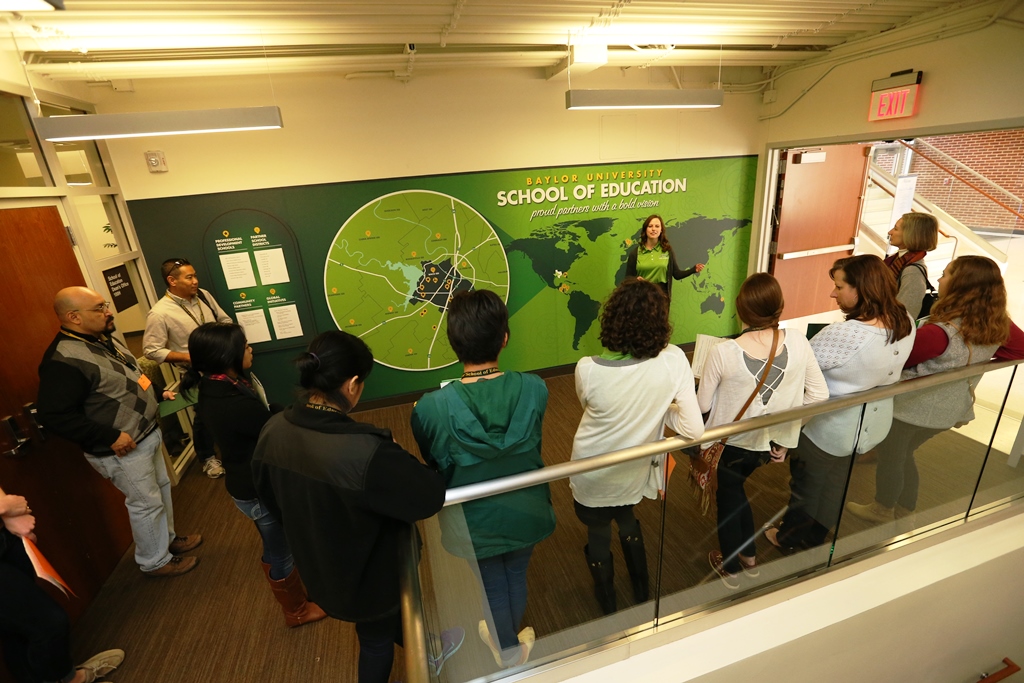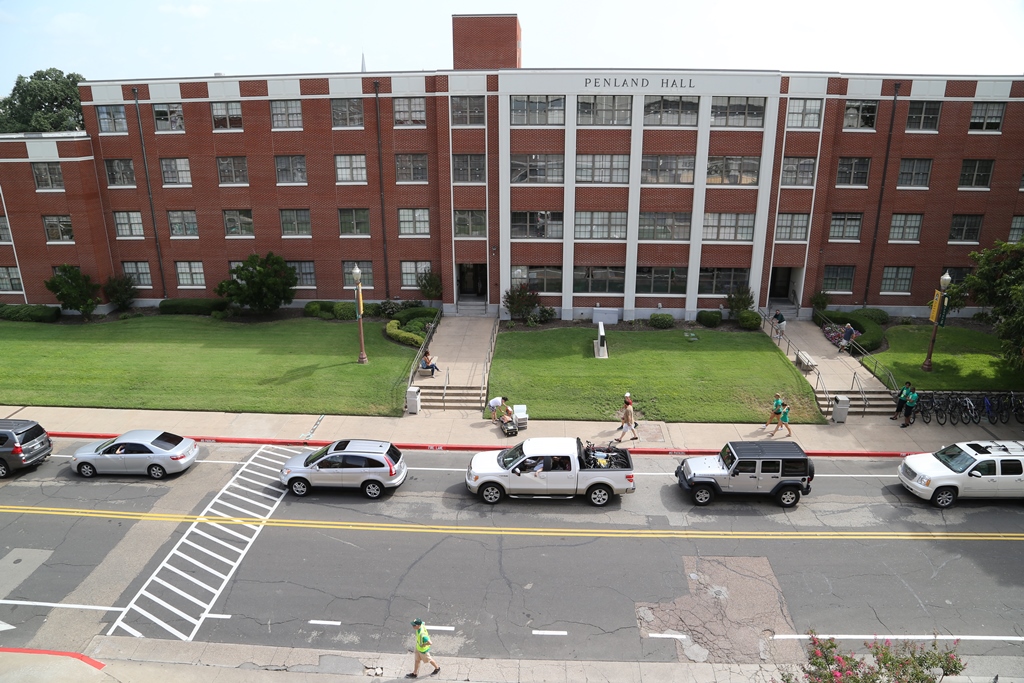Baylor Regents Approve Ed.D. in K-12 Educational Leadership, Authorize $31 Million for Upgrades to Penland Hall, Memorial Dining Hall and Baylor Energy Complex/Substation
Contact: Lori Fogleman, 254-710-6275
Follow Lori on Twitter at @LoriBaylorU
Follow Baylor Media Communications on Twitter: @BaylorUMedia
WACO, Texas (Feb. 13, 2015) – At its regular February meeting, Baylor University's Board of Regents voted to approve a new Ed.D. in K-12 Educational Leadership and authorized $31 million to refurbish Penland Hall, renovate Memorial Dining Hall and expand the Baylor Energy Complex and Electrical Substation to meet the campus energy needs of the future.
Also during Friday's meeting, Baylor President and Chancellor Ken Starr welcomed Edwin Trevathan, M.D., M.P.H., Baylor's executive vice president and provost-designate, who will begin as the University's chief academic officer on June 1. Trevathan currently serves as dean and professor of epidemiology in the College for Public Health and Social Justice at Saint Louis University and professor of neurology and pediatrics at SLU's School of Medicine.
Approved by Regents, the new Ed.D. in K-12 Educational Leadership is an innovative doctoral program that will prepare highly qualified practitioners to lead and transform pre-collegiate education in public, Christian and private educational systems and related agencies. Specifically, it will focus on incorporating Baylor's historic Christian commitment as it prepares future educational leaders to frame and address complex problems of practice, such as team-building and management, decision-making, relational and servant leadership, as well as how to approach data analysis, finance, policy analysis, management and legal questions from a Christian perspective.
Few doctoral leadership programs in Texas, or nationally, offer advanced graduate education from a Christian perspective, especially professional practice doctoral program in educational leadership, said Jon D. Engelhardt, Ph.D., dean of Baylor's School of Education.
"Baylor is well positioned to provide preparation for future educational leaders grounded in Christian principles," Engelhardt said. "The Ed.D. in K-12 Educational Leadership supports Pro Futuris' tenet of transformational education by preparing future leaders for K-12 education, who will act out of the tenets of their faith and pursue equity and social justice in educational organizations."
As an institutional member of the Carnegie Project for the Education Doctorate (CPED), a consortium of 55 major universities, Baylor faculty have been involved in the national dialogue on redesigning the professional practice doctorate in education.
The School of Education expects to begin the new Ed.D. program in June.
Regents also approved funding for several facility enhancement projects on the Baylor campus.
As part of the University's master plan to renovate existing residence halls, the board authorized $19 million to refurbish Penland Residential Hall. Construction will begin in May and is expected to be completed by summer 2016.
Opened in 1960, the 96,100-square-foot Penland Hall will be the third among 10 Baylor residence halls to be restored over an eight-year period. South Russell Hall's refurbishment was completed in summer 2014, while work on North Russell Hall will be completed this summer. When these three projects are completed, the University will have invested $44 million in a program that is expected to provide $140 million in renovations and enhancements to Baylor's residential facilities.
The Penland refurbishment will include updated rooms with new furniture and fixtures; new study, social and spiritual spaces; apartments for faculty-in-residence and a resident chaplain; and new mechanical, electrical and plumbing systems.
The board also approved $4.6 million to complete renovations to Memorial Dining Hall and $7.2 million to upgrade the Baylor Energy Complex and Electrical Substation.
Renovations to Memorial will include expanding the dining hall to 22,000 square feet and seating for 600 students, adding more food platforms and finishing upgrades. Construction will begin in May and is expected to be completed in time for the fall semester.
Expansion and upgrades to the Baylor Energy Complex and Electrical Substation will begin this spring and will be online in the fall. The upgrades will supply upcoming campus electrical loads and provide additional electrical capacity for the future.
"Baylor continues to move forward powerfully into the future as we implement the goals under Pro Futuris," said Richard Willis, B.B.A. '81, M.B.A. '82, chair of the Baylor Board of Regents. "The new doctoral degree in education will allow Baylor to prepare future leaders with an innovative program that addresses educational challenges facing our communities from a Christian perspective. We also remain tirelessly focused on our students and providing them with a transformative education that includes the spaces where they live, learn and discern their calling to serve God. We are proud of the progress we've made over an eight-year period to ensure that our students have a high-quality and meaningful experience while they are living on our campus."
On Thursday night, Regents and Executive Council members hosted Dr. Trevathan and Baylor faculty for a special reception in Barfield Drawing Room.
"Regents have established a tradition of taking time during our February board meetings to thank our faculty for all they do and to express our appreciation for the manner in which they impact the lives of our students," Willis said. "We are deeply grateful for Baylor's remarkable and caring faculty. They represent a community of scholars committed to the highest pursuits of teaching and scholarship and, through their research and creative works, offer a distinctive voice to global conversations about critical issues facing our world."
ABOUT BAYLOR UNIVERSITY
Baylor University is a private Christian University and a nationally ranked research institution, characterized as having "high research activity" by the Carnegie Foundation for the Advancement of Teaching. The University provides a vibrant campus community for approximately 16,000 students by blending interdisciplinary research with an international reputation for educational excellence and a faculty commitment to teaching and scholarship. Chartered in 1845 by the Republic of Texas through the efforts of Baptist pioneers, Baylor is the oldest continually operating University in Texas. Located in Waco, Baylor welcomes students from all 50 states and more than 80 countries to study a broad range of degrees among its 12 nationally recognized academic divisions. Baylor sponsors 19 varsity athletic teams and is a founding member of the Big 12 Conference.
ABOUT BAYLOR SCHOOL OF EDUCATION
The Baylor School of Education is accredited by the National Council for Accreditation of Teacher Education and consists of four departments: Curriculum and Instruction (preparation for classroom teachers and specialists); Educational Administration (post-graduate preparation for school leadership); Educational Psychology (undergraduate and graduate programs for those who are interested in learning, development, measurement and exceptionalities); and Health, Human Performance and Recreation (preparing for sport- and health-related careers, athletic training and careers in recreational professions, including churches).The School of Education enrolls more than 1,000 undergraduate students and 300 graduate students, employs 70 faculty, and is one of the few school s in the State of Texas that offers a yearlong teaching internship.



